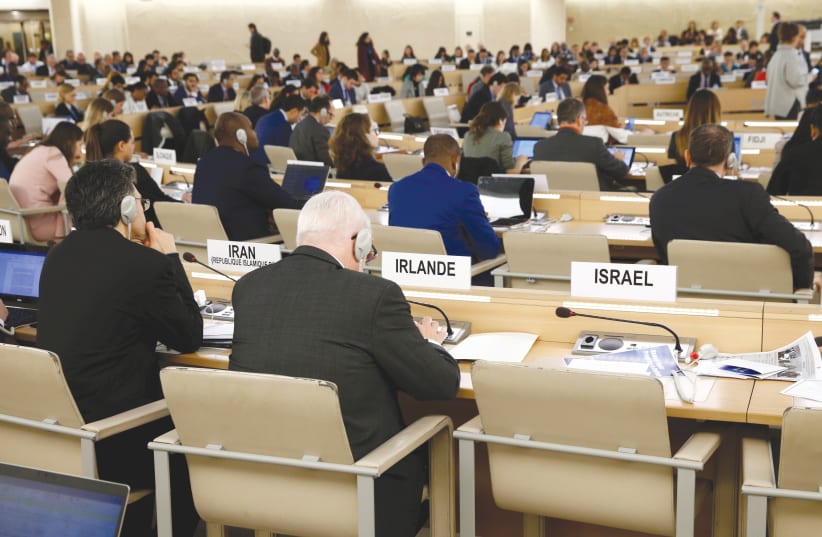Israel is going to elections once again. Once again, the most important issue that faces the State of Israel will not be addressed by the leading politicians or by the electorate. Voters once again will not be presented with any proposal on the future of the relations between the State of Israel and the Palestinian people.
We will hear some common well-known and basically irrelevant mantras such as “we support the two-state solution” or alternatively “no Palestinian state will be established between the river and the sea,” or on the far-Right, “Jordan is Palestine and Palestinians should move there.”
No one will suggest restarting negotiations with the Palestinian leadership. No one will demand that the Palestinians themselves finally hold elections and that east Jerusalemite Palestinians should have the right to vote in those elections. Most Israeli politicians will continue to support the “divide and rule” policies that Israel has fostered for the past 20 years, supporting the myth that there is no partner for peace on the Palestinian side.
I am writing from Geneva, where I am a participant in an experts’ meeting in front of the Independent International Commission of Inquiry on the Occupied Territory, including east Jerusalem and Israel, established by the UN Human Rights Council. In March, I traveled to Amman to appear before the commission, as the State of Israel prohibited the commission’s members from entering Israel, the West Bank and Gaza.
The State of Israel refuses to cooperate with international commissions of inquiry even when the commissions are also explicitly committed to interviewing victims of Palestinian terrorism, and not only examining the alleged crimes committed by Israel. The commission issued its first report in May 2022 and was immediately condemned by Israel as being antisemitic. The commission’s report was not antisemitic and neither are any of the commissioners.


FOR ISRAEL, for a long time, any critique of the country and its policies are automatically labeled “antisemitic.” Let’s be totally clear, antisemitism is totally illegitimate in all forms at all times. Criticism of Israel, its policies in the occupied territories, and the discrimination against the Palestinian citizens of Israel, and even questioning Israel’s right to exist as a state with Jewish supremacy, is legitimate.
Many Israeli citizens are also critical of Israel’s policies in the occupied territories and they are certainly not antisemitic. Labeling legitimate criticism of Israel as antisemitic – the strategy adopted by Israel’s governments for many years – is dangerous and does injustice to all those victims of antisemitism throughout our history.
If every criticism against Israel is antisemitic, including legitimate criticism, we will fail to correctly identify antisemitism when it really is antisemitism. Furthermore, the labeling of “antisemitism” to legitimate criticism may silence critics of Israel, but that also makes them complacent in the clear violations of international law and international humanitarian law.
The discussions at the Geneva meeting were aimed at helping the commission to compose its next report, which will be submitted to the UN General Assembly in October. The discussions were very emotionally difficult because almost all of the criticism raised against Israel is completely true.
The Israeli occupation from June 1967 is illegal under international law, and the human rights abuses against the Palestinian people are more severe today than ever. The demise of the two-state solution, and with it the deepening of Israeli control over all of the Palestinian territories, forces the question regarding Israel’s claim of its own democracy.
The increase in demolitions of Palestinian homes and the threat of total removal of Palestinians from several neighborhoods in east Jerusalem and in places such as Masafer Yatta in the West Bank are blatant examples of the discriminatory policies of Israel toward the Palestinians, which are illegal under international law.
The fiasco of the inability of the Knesset to renew the emergency laws which grant Israeli settlers’ superior legal status in the occupied territories demonstrates the existence of separate legal status for Jews and Palestinians in the West Bank. This is one of the clear legal definitions of an apartheid regime.
THE FOURTH Geneva Convention, which the Israeli legal systems sometimes refer to (when convenient), clearly state the illegality of imposing a new legal regime on occupied territories. According to international law, and according to Israeli law, the legal sovereign of the Belligerent Occupation (the terms used in the Fourth Geneva Convention) is the commander of Israeli military forces in the West Bank. In general, Israel acts under this clause, and “laws” in the occupied territories are military orders signed by the military commander.
The “settlers’ law” which the Knesset has failed to renew, is a clear violation of international law. It should have never been issued by the Knesset in the first place. But that is all part of the reality in which it is impossible to continue to define the occupation as temporary; after 55 years it is more than ridiculous to hold on to the claim that the occupation is an interim situation. Without actually declaring it, Israel has been engaged in the process of annexing the West Bank without making it official.
Officially annexing the territory would be blatantly illegal and as a democracy would require the granting of citizenship to more than 3 million Palestinians, and Israel has no intention of doing that. Look at the 357,000 Palestinians who have been living in Israeli-annexed east Jerusalem for 55 years without having Israeli citizenship (or any citizenship for that matter).
I hope that the upcoming round of Israeli elections is not mainly about “Netanyahu yes” or “Netanyahu no.” I hope that our political leaders present to us what they honestly propose for the future of the relations between Israel and its Palestinian neighbors. I would like to hear from some of our potential leaders how we can truthfully imagine a genuine peace process.
I would like to be presented with a realistic vision of how they plan to prepare the ground for the change that has to happen. After so many years of inciting hatred, embellishing mutual fear and suspicion between Israeli Jews and Palestinians – both inside of Israel and across the borders between Israel and Palestine – how do our potential leaders propose that we actually find a way to eventually live in peace between the river and the sea?
The writer, a political and social entrepreneur, has dedicated his life to Israel, and to peace between Israel and her neighbors. He is now directing The Holy Land Bond.
